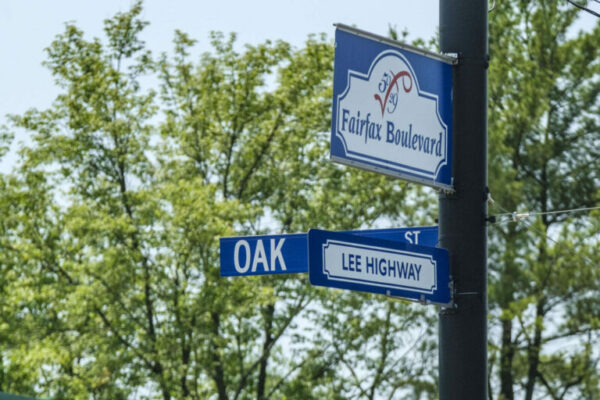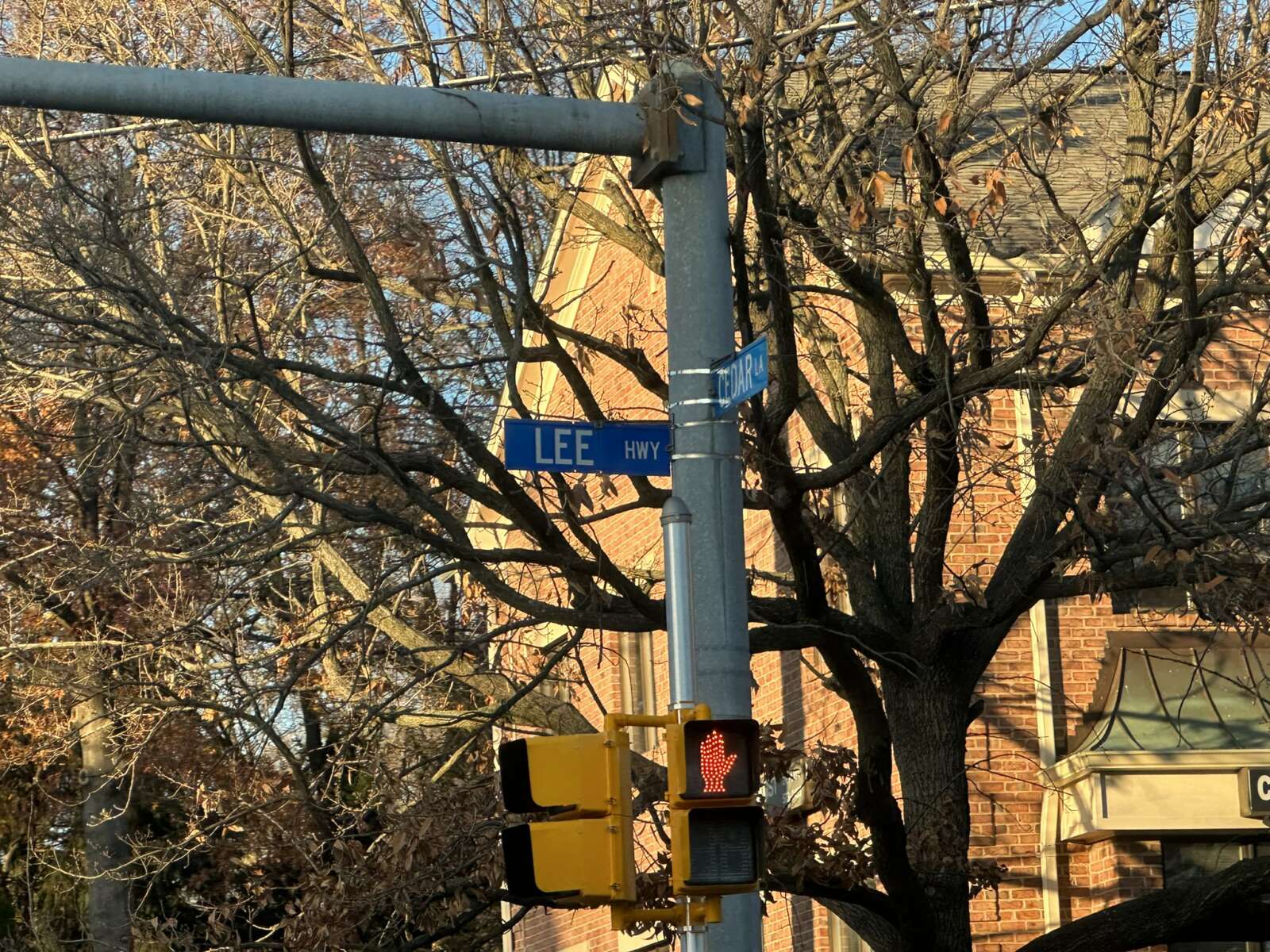
Officially, Fairfax County doesn’t have a Lee Highway or Lee-Jackson Memorial Highway anymore, but months after the names were dropped, they can still be seen on street signs throughout both corridors.
By the end of this month, that should no longer be the case — at least for smaller signs, the Fairfax County Department of Transportation says. A contractor is replacing the small blue signs at street corners with ones identifying the roadways as Route 29 and Route 50, respectively.
“This work is underway, and we anticipate this work to be complete by the end of November,” FCDOT Head of Communications Freddy Serrano told FFXnow.
The process of replacing larger, overhead directional signs, however, isn’t expected to begin until next year.
Getting those signs made and installed will be the Virginia Department of Transportation’s responsibility, though the county is covering all of the costs. A VDOT spokesperson says the department hopes to finalize an agreement with a contractor by the end of this year.
“It will involve 110 signs and it should take about two years to complete from the start of the contract that is anticipated to start in Jan. 2024,” VDOT said by email.
According to Serrano, a preliminary schedule from VDOT estimates that the overhead sign replacements will be finished by the end of 2025.
The Fairfax County Board of Supervisors voted on Sept. 13, 2022 to stop referring to routes 29 and 50 as Lee and Lee-Jackson Memorial, names adopted in the early 20th century as nods to Confederate generals Robert E. Lee and Thomas “Stonewall” Jackson.
Instead of giving the roadways entirely new names, as Arlington County did with its Route 29 segment in 2021, the board opted to use the route numbers to reduce confusion and the cost of new street signs. FCDOT staff previously said changing the signs would be more challenging for longer names.
At the time of the vote, county staff estimated that the sign updates would cost about $1.4 million. It cost about $46,000 for FCDOT’s contractor to fabricate and install the corner street signs, according to Serrano.
“Most of the costs of the sign replacement will be VDOT’s replacement of the larger overhead signs,” he said. “FCDOT will not have an updated cost estimate for that portion of the sign replacement until VDOT begins their preliminary design.”
County staff estimated it would take another $1.5 million to fund grants to help affected property owners cover expenses for updating business licenses, land records and other documents, as recommended by the Confederate Names Task Force that reviewed the proposed renamings.
On its website, FCDOT says the county “is developing” a financial assistance program, but Serrano confirmed to FFXnow that “the proposed grant program for businesses has not been approved at this time.”
The county updated addresses in its records to reflect the name changes, including for property taxes and voter registrations, on July 5.
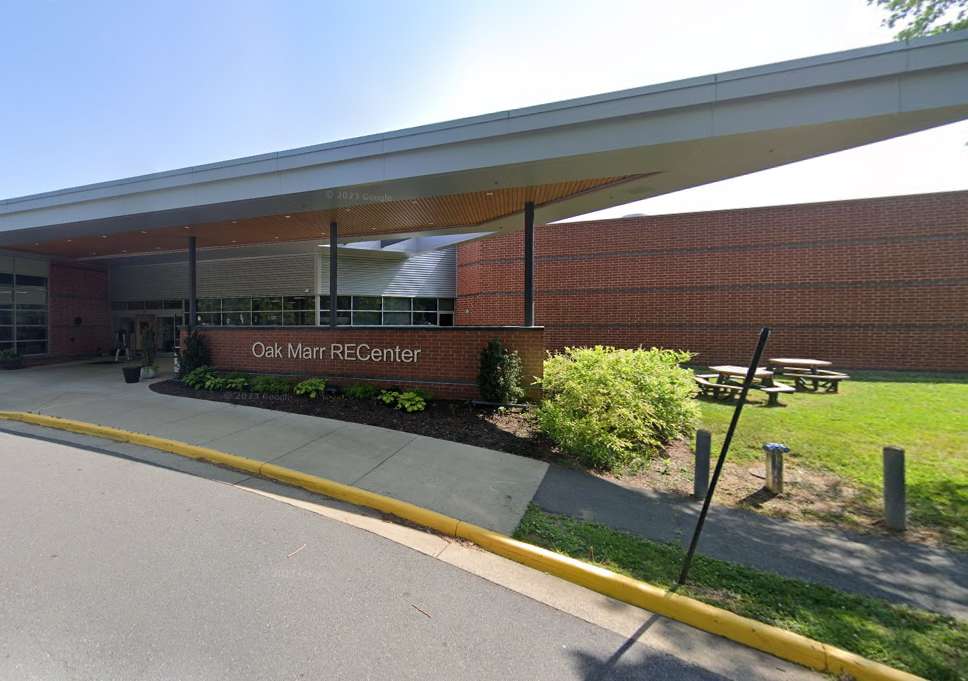
Fairfax County has shed another vestige of its Confederate past.
Oak Marr Park, which is home to the Oak Marr RECenter and Golf Center Complex, was renamed “Oakmont” earlier this month by the Fairfax County Park Authority board, which approved the change at its Nov. 8 meeting.
Located at 3200 Jermantown Road, the facilities were originally named after John Quincy Marr, a Warrenton militia captain who became the first Confederate soldier killed by the Union Army in the Civil War.
“The elimination of ‘Marr’ from the name of these park facilities follows the county’s pattern of moving away from names and titles that glorify the Confederacy,” the park authority said.
Until recently, Marr had also been recognized with a stone monument outside the old Fairfax County Courthouse at 4010 Chain Bridge Road. The monument was erected in 1904 by the Daughters of the Confederacy, marking the spot where he died on June 1, 1861, according to the FCPA.
The monument, which was accompanied by two howitzers and a state memorial marker, was the subject of a protest by the local advocacy group Reston Strong in June 2020, ultimately leading to their removal on Nov. 6, 2020.
Continuing a trend that began in 2017 with J.E.B. Stuart High School’s renaming as Justice High School, the Fairfax County History Commission conducted a review that identified more than 26,000 streets and landmarks in the county with names related to the Confederacy.
The most significant change to come out of that review and a subsequent Confederate Names Task Force has been the elimination of Lee Highway and Lee-Jackson Memorial Highway as the county’s names for routes 29 and 50. Those renamings took effect on July 5, though the street signs are still being changed.
FCPA staff initially proposed replacing Oak Marr with “Oak District,” noting that the site’s scope and amenities classify it as a district park, per the county’s comprehensive plan. But some board members wondered at an Oct. 25 meeting if the name might create confusion by implying the existence of an Oak magisterial district.
One board member admitted finding it “just a little plain.”
“You cannot incorporate Oakton into the park, because there’s already an Oakton Community Park, although some of the feedback I got indicated folks want Oakton in there somehow,” said Ken Quincy, who represents Oakton as the board’s Providence District member.
Before the board vote on Nov. 8, FCPA Executive Director Jai Cole credited Quincy with proposing Oakmont, noting that it “keeps the O and the M as Oak Marr and Flint Hill next to Oakmont.”
“Sounds like a great idea,” Mount Vernon District Representative Linwood Gorham said, while another board member suggested that it “sounds like a winery.”
An FCPA spokesperson says the park authority is in the process of transitioning its website and registration systems for camps, classes and other services to the new name, a process expected to finish by mid-November.
The signage at the affected facilities will likely take longer to get replaced.
“We do not currently have a set date for the installation of the physical signs at the Oakmont Rec Center and Golf Center as they need to be manufactured and transported to the site,” the spokesperson said. “We will hope to have a better idea of that timeframe within the coming weeks.”
Image via Google Maps
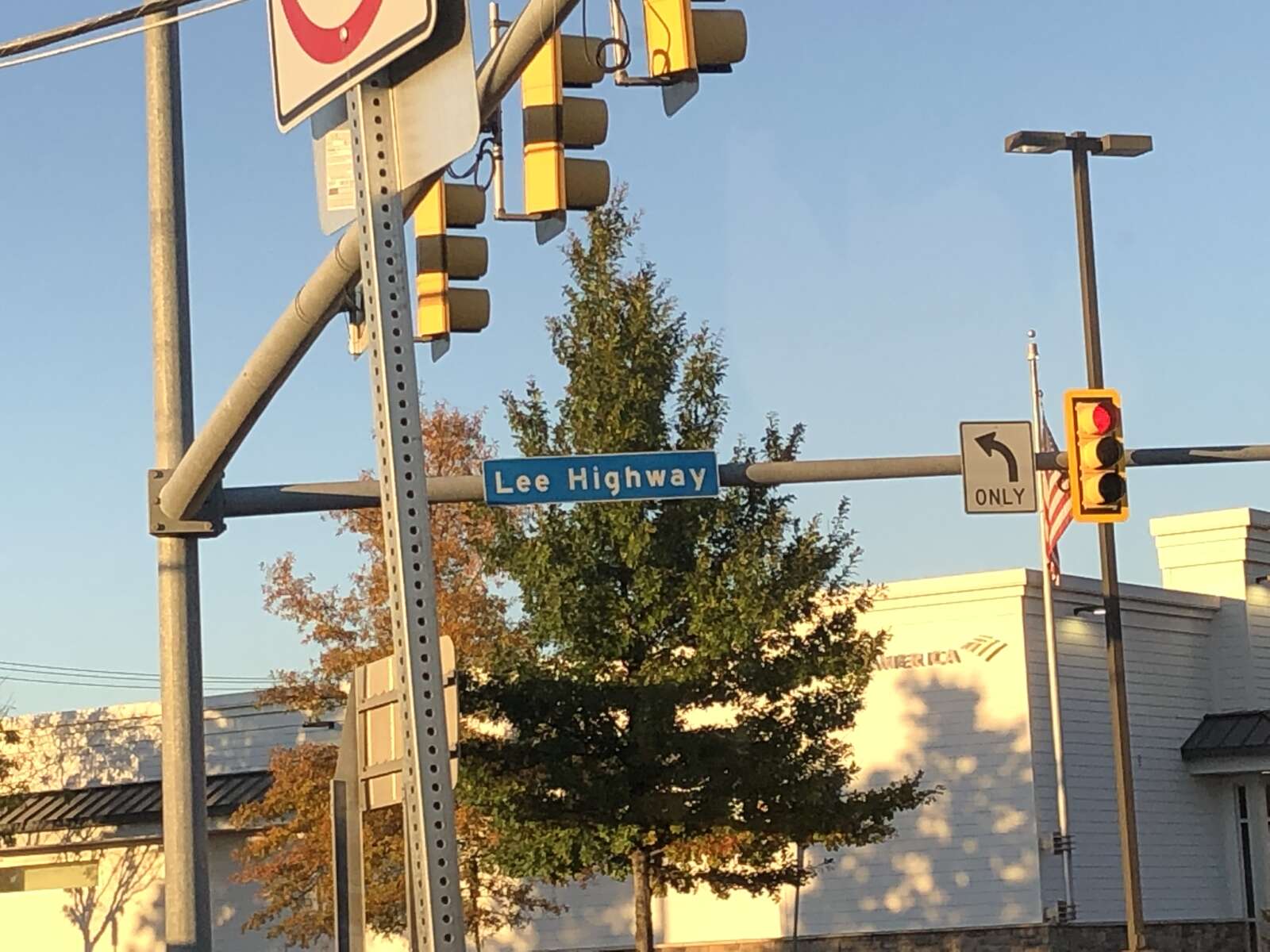
Fairfax County can officially retire Lee Highway and Lee-Jackson Memorial Highway as its names for routes 29 and 50.
The highways will be renamed after their route numbers effective July 5, the county announced today (Thursday).
The Fairfax County Board of Supervisors voted on Sept. 13 to drop the highway names, which were homages to Confederate generals Robert E. Lee and Stonewall Jackson, but the Commonwealth Transportation Board didn’t approve the changes until May 24.
“The renaming of both roadways signifies our unwavering dedication to acknowledging the experiences of our community, especially our African American neighbors,” Board of Supervisors Chairman Jeff McKay said in a statement. “Thanks to the dedicated work of all the community members who participated in the Confederate Names Task Force, we can put these divisive names behind us and continue to move our County in the right direction.”
According to the county, its records will automatically update on July 5 to reflect the new street names, including for property taxes, voter registrations and Fairfax Water.
However, individual property and business owners will be responsible for updating their address when it comes to their driver’s license, legal documents, utility bills, mail and other services.
The county says it’s developing a grant program to provide financial assistance for those affected by the name changes, though the program needs to be approved by the Board of Supervisors.
The Virginia Department of Transportation will replace the road signs, but the county has agreed to cover those costs, which were previously estimated to range from $1 million to $4 million, depending on the length of the new names.
The Board of Supervisors created the Confederate Names Task Force in 2021 after the Fairfax County History Commission identified hundreds of sites bearing names associated with the Confederacy, including Lee and Lee-Jackson Memorial highways.
According to the task force’s report, Lee Highway covers about 14 miles from Centreville to Falls Church, with a break in the middle where Route 29 meets Route 50 in Fairfax City. It was named after Robert E. Lee in 1919.
Lee-Jackson Memorial consists of about 8 miles of Route 50 in western Fairfax County. The name was adopted in 1922.
The highways have already undergone renamings in other jurisdictions, including Arlington County, Fairfax City and Loudoun County.
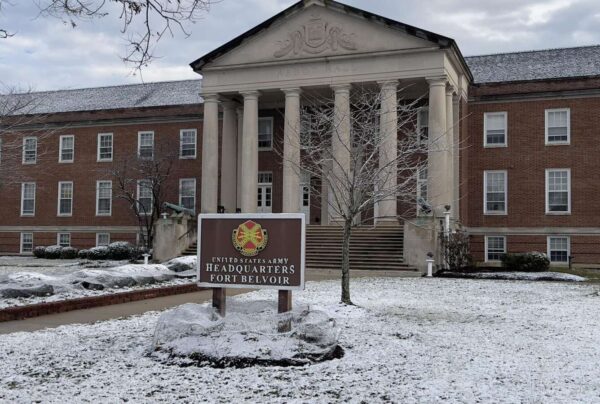
Fairfax County’s Board of Supervisors is no stranger to renaming things, from roads to magisterial districts. But now, the board is leading a push not to rename a site associated with slavery.
In a Board of Supervisors meeting on Tuesday (March 7), Mount Vernon District Supervisor Dan Storck raised the topic of Fort Belvoir’s potential renaming. The base is named for the Belvoir plantation that once occupied the site.
In a final report last year, a Department of Defense Naming Commission recommended that Fort Belvoir be renamed. According to the Association of the United States Army:
One final matter involves Fort Belvoir, Virginia, named for a plantation that once occupied the land. Belvoir has ties to the Confederacy but was not named in 1935 in direct commemoration of the South. The commission was not given authority to rename Fort Belvoir, which was previously known as Fort Humphries, but the commission believes it should have a new name. The report “strongly encourages” the defense secretary and Army secretary to review the history of the installation, noting it was the site of the celebration of Confederate Memorial Day.
While Fairfax County and other localities have routinely renamed locations, the Fairfax County History Commission expressed concerns about the Naming Commission’s report for a few reasons, from questions about historical inaccuracies to uncertainty about the effect on how Black history should be represented at the fort, according to Storck.
“Any action taken by the army should be transparent, based on evidence, and include local community and stakeholders,” Storck said. “Removing the name Belvoir may reduce the likelihood that these stories of the enslaved African Americans and free Black residents who lived on the base will be told.”
Storck proposed that the Board of Supervisors recommend the Fairfax County History Commission’s report be sent to the Secretary of the Army and the Naming Commission Historian voicing their concerns. The proposal was unanimously approved by the Board of Supervisors.
Board of Supervisors Chair Jeff McKay said concerns about the renaming came up in a recent meeting with the base commander. Whatever the ultimate decision is, McKay said the process around the name change should be more transparent and should involve Fairfax County.
“I had an opportunity to sit down with the base commander for quite some time and this was the subject of conversation,” McKay said. “I know it’s created a lot of angst for Fort Belvoir. I think it’s important as this consideration is being made — not by the county — but that county input is part of the decision process.”
A public affairs officer from Fort Belvoir told FFXnow that any consideration of renaming the base will be open and transparent and the Fort Belvoir leadership has already started moving forward on renaming four streets honoring Confederate leaders:
The Naming Commission encouraged the Secretary of Defense and the Secretary of the Army to review the relevant historical facts and consider renaming Fort Belvoir. The Army will begin an open and transparent process to consider renaming the installation.
The redesignation of Beauregard Road, Stuart Street, Lee Road, and Johnston Road fit within the legislative mandate of the Naming Commission. Fort Belvoir has already begun consulting with the local community, through the Fairfax County History Commission, to recommend name changes for the four streets currently named after Confederate leaders.
In October 2022, Secretary of Defense Lloyd J. Austin III concurred with all of the Naming Commission’s recommendations, including redesignating nine Army installations with names that are rooted in their local communities and that honor American heroes whose valor, courage, and patriotism exemplify the very best of the U.S. military.
Fort Belvoir is standing by to assist in that effort as requested.
Photo via Fort Belvoir/Facebook
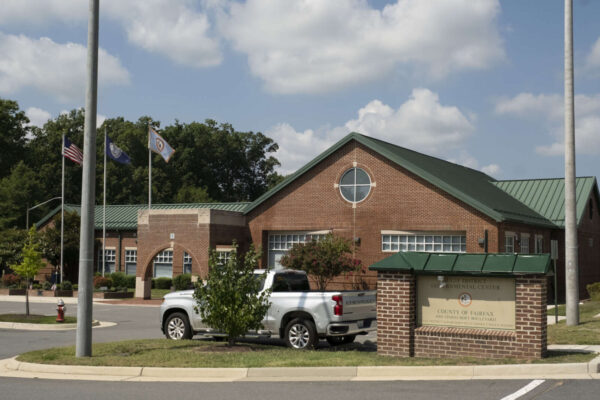
Fairfax County has opted not to move forward with a potential Sully District renaming.
Sully District Supervisor Kathy Smith announced at yesterday’s board meeting that she believes “the best step forward at this time is to retain” the name of the magisterial district, which encompasses the southwestern corner of Fairfax County.
Based on input from virtual town halls, emails, and community conversations, she proposed instead finding new ways to educate residents and visitors about the area’s history, particularly at the plantation in Chantilly that gave the district its name and is now the Sully Historic Site.
“In working on a path forward, I am actively talking with the NAACP, the county’s equity officer and the Fairfax County Park Authority executive director about ways we can have a more honest conversation about the history of our country, county and the Sully District,” Smith said in her board matter.
Supported without further discussion by the full Board of Supervisors, the decision concludes a months-long effort to gather public feedback after the county’s 2021 Redistricting Advisory Committee (RAC) recommended name changes for Sully and the former Lee District earlier this year.
After completing its primary task of redrawing the county’s electoral district maps, the committee was charged in January with reviewing whether to rename any districts based on possible historical ties to the Confederacy, slavery or racism.
According to a report finalized in March, Sully District was named after the plantation built by Richard Bland Lee, the first person to represent Northern Virginia in Congress. It said four generations of humans had been enslaved and trafficked at the property, including over 100 people during Lee’s tenure as owner.
When Lee inherited the land from his father in 1787, he received 29 enslaved people, according to the park authority’s history of the site, which features Lee’s 225-year-old house as well as 120 acres of park, gardens, a smokehouse and other structures.
While the website acknowledges the presence of slavery, it refers to the property as Lee’s “country home.” Smith’s board matter suggested that the county be more active and creative in providing information and programming about that aspect of the site’s history.
Smith said people weighed in with a variety of perspectives on whether to rename Sully District, including at town halls held on June 2 and Sept. 1, but the “most important thing I heard in these conversations was the need to heal our community.”
“The best way to do this is to work on ways to tell the true story of our sometimes complicated and misunderstood history and that of the Sully District specifically,” she said. “One way to do this is to educate the public about how land was developed, who benefitted and who was marginalized in the process.”
In addition to reevaluating what stories are told at the Sully Historic Site, the county could highlight historically Black neighborhoods affected by its westward expansion, similar to efforts to preserve Gum Springs in the Mount Vernon area. Read More
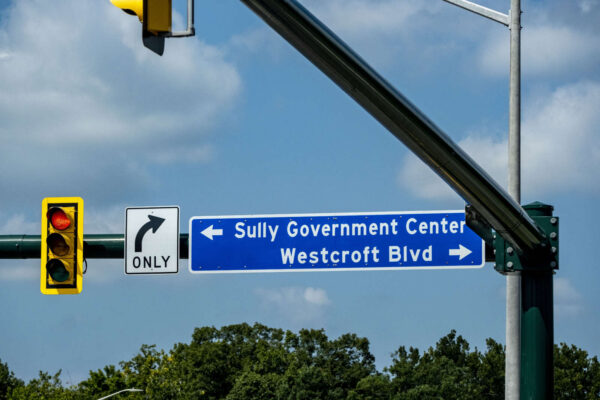
The public engagement process regarding a possible name change for the Sully District is kicking off next month.
A virtual meeting to discuss changing renaming the district is set for tomorrow (Thursday) at 7 p.m. A brief presentation by county staff will be followed by an online forum. Interested participants can email sully@fairfaxcounty.gov to receive a meeting link.
The discussion follows a March recommendation by the Fairfax County Redistricting Advisory Committee for a name change. The committee recommended renaming the Lee and Sully districts because of the names’ historic ties to the Confederacy and slavery.
In late June, the Fairfax County Board of Supervisors unanimously voted to change the name of the Lee magisterial district to Franconia.
A spokesperson for Sully District Supervisor Kathy Smith said she has not reached a decision on whether a name change is warranted.
“Her goal is to make a decision after the meeting but doesn’t have a specific date to make a decision,” the spokesperson wrote in a statement to FFXnow.
Residents are also encouraged to share their comments and feedback by emailing sully@fairfaxcounty.gov or calling 703-814-7100.
A decision is not expected at the forum, according to event organizers.
— Sully Supervisor Kathy L. Smith (@SullySupervisor) August 15, 2022
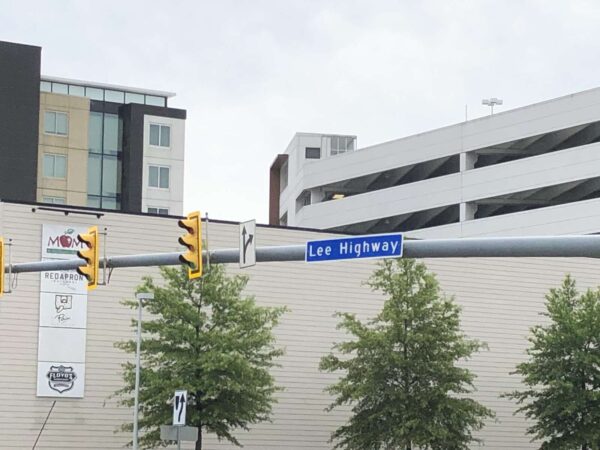
A formal vote won’t come for another month, but several Fairfax County supervisors indicated support yesterday (Tuesday) for using routes 29 and 50, respectively, as the official names for the roads known for now as Lee and Lee-Jackson Memorial highways.
The Board of Supervisors directed county staff by a 9-1 vote to prepare a resolution for its next meeting on Sept. 13 endorsing Route 29 and Route 50 as the new names after a year-long review process that included a community task force and public surveys.
While route numbers don’t carry the same symbolism as Arlington County renaming its portion of Lee Highway after abolitionist John Langston, board members expressed hope that the move will reduce the confusion of navigating the county in addition to discarding reminders of the area’s Confederate past.
“Frankly, calling them by the route numbers is what a lot of people already do today voluntarily, so I don’t see this as a heavy lift at all for these two major corridors and I think will chart us a better course moving forward,” Chairman Jeff McKay said.
If the resolution passes, it will go to the Commonwealth Transportation Board, which will have the final say, as required by state law.
Evoking Confederate generals Robert E. Lee and Stonewall Jackson, the highways were among 150 sites in the county with names whose Confederate origins were confirmed by a 2020 report from the Fairfax County History Commission. Combined, they represent over 20 miles of roadway from Chantilly on the county’s western end to the Falls Church border in the east.
Recommending that both roads be renamed, the board-appointed Confederate Names Task Force suggested five alternatives each, including the route numbers, in a report finalized in December 2021.
Surveys of property and business owners in the corridor conducted this past spring found that they preferred the route numbers over the other options, which included following Arlington’s lead with Langston Blvd for Lee Highway.
“I think this is basically as close as we’re going to get to consensus on the names,” said Hunter Mill District Supervisor Walter Alcorn, who chairs the board’s transportation committee. “I think this is a very reasonable and practical way to address the challenge that we’re facing, and I think it’s a big step towards moving away from memorializing that time in history and some of those folks and really updating that.” Read More
A report recommending that Fairfax County rename its portions of Route 29 and Route 50 will go before county leaders tomorrow (Tuesday), even as concerns about the financial impact linger.
Compiled by the 26-person Confederate Names Task Force, the report details the process used to determine that Lee Highway and Lee-Jackson Memorial Highway should get new names and recommends five possible replacements for each road:
Recommended Top Five Alternative Names for Lee Highway (Route 29)
Cardinal Highway, 13 votes
Route/Highway 29, 12 votes
Langston Boulevard/Highway, 6 votes
Lincoln-Douglass Highway, 6 votes
Fairfax Boulevard/Highway, 5 votes
Recommended Top Five Alternative Names for Lee-Jackson Memorial Highway (Route 50)
Little River Turnpike, 16 votes
Unity Highway, 12 votes
Route 50, 6 votes
Fairfax Boulevard, 4 votes
Blue & Gray Highway, 3 votes
Appointed by the Fairfax County Board of Supervisors last July, the task force voted 20-6 on Nov. 30 in favor of changing the name of Lee Highway and 19-6 for Lee-Jackson Memorial.
Task force chair Evelyn Spain will present the final report to the board during its regular meeting tomorrow, which will begin at 9:30 a.m.
“The Board set up this important committee to review the names of two major arterials and now we are eager to hear their report,” Board Chairman Jeff McKay told FFXnow in a statement. “Any decision to change street names is one our Board will take seriously as we consider the report as well as other community input before any decisions are made. I am proud that this Board has a strong record of focusing on racial inequities and advancing our community together.”
The two highways are among 150 landmarks in the county identified as bearing names tied to the Confederacy, according to an inventory that the Fairfax County History Commission presented to local leaders in December 2020.
The commission found that the Virginia General Assembly established Lee Highway in 1922 as a statewide route serving as a national memorial for Confederate Gen. Robert E. Lee.
That same year, the state House and Senate Roads Committee also agreed to rename a section of Little River Turnpike after Lee and fellow Confederate Gen. Thomas Jonathan “Stonewall” Jackson.
The task force recommended that both highways get new names to “accommodate the equity initiatives and growing diversity in Fairfax County,” the report says. It also acknowledges that the changes “will likely be major impositions upon the residences, businesses, and communities” in those corridors.
The group suggests that the Board of Supervisors consider providing financial assistance to those affected, if it ultimately approves the name changes.
The final report features several letters from the task force members who opposed or abstained from voting on the name changes. Objections include:
- A public survey found 23,500 respondents want to keep the names as they are and 16,265 in support of changes
- The cost to make the change, which could total $1 million to $4 million, according to county staff
- Even though the institution of slavery was evil, the name switch “erases history”
“We believe the $1M to $4M required to rename these two roads would be more effectively spent pursuing a community engagement project (e.g. an African-American Heritage Trail, a museum, and/or new historic markers),” the dissenters said, noting that Prince William County is adding to its African American History Trail. “We encourage Fairfax County to pursue similar projects.”
To coincide with Black History Month, the county launched a project last week focused on local Black and African American experiences, including support for students to identify options for new historical markers.
Angela Woolsey contributed to this report.
A task force of nearly 30 people has recommended renaming two highways in Fairfax County, following concerns that their invocation of the Confederacy runs counter to the county’s goal of creating an inclusive environment.
After months of meetings and debate, the Confederate Names Task Force voted 20-6 yesterday (Tuesday) in favor of a change for Lee Highway (also known as Route 29) and 19-6 for Lee-Jackson Memorial Highway (Route 50), with at-large member Tim Thompson abstaining.
The recommendation is just one step in the renaming process. It came after the task force gathered public input with a series of listening sessions and an online survey.
The Fairfax County Board of Supervisors and state’s Commonwealth Transportation Board would have to sign off on any name changes.
Some committee members argued that renaming the highways would “erase history.” Jenee Lindner, one of four Springfield District representatives, said doing so was wrong.
“If we’re going to move forward, let’s eradicate that term, ‘erasing history.’ It’s not true. Personally, we’re erasing stupidity and injustice and immorality,” Pastor Paul Sheppard from Providence District countered.
Dranesville District representative Barbara Glakas, a retired teacher from Fairfax County Public Schools, said if Confederate leaders had their way, the U.S. might look more like Europe, with fragmented countries, and slavery might have continued for much longer.
The task force’s votes diverged from the results of the public survey, where 23,500 respondents said they support keeping the names as they are, and 16,265 called for changing them.
“We can’t just ignore that opinion, whether you agree with it or not,” said Braddock District’s Robert Floyd, who voted against the recommendations and was one of a handful of people who tuned into the meeting remotely.
The survey was more designed to be a pulse check than as a poll that met scientific sampling standards and could be representative of the entire population. It had a mechanism to prevent people from taking it repeatedly, but it only blocked Internet Protocol (IP) addresses, meaning people could still participate multiple times, skewing results.
For respondents who wanted the highways to be renamed, many people proposed using Route 29 and Route 50, which are already used on maps.
Sully District committee member Marvin Powell said society renames things all the time and the county needs to think of the citizens of today and tomorrow.
The committee also discussed how families’ properties were taken by eminent domain for the roads in question. Sheppard said his family was affected and joked one road could have originally been named after his family.
The Board of Supervisors appointed the task force in July after the Fairfax County History Commission compiled an inventory of streets, monuments, and public places with names tied to the Confederacy. It found “approximately 157 assets, including parks, within the County that bear confirmed Confederate associated names,” the December 2020 report said.
Michael Champness, an at-large member of the Confederate Names Task Force, said before the votes that changing the two highway names sends an important message, but the county doesn’t necessarily need to rename all of those landmarks.
“We might be in a good position to maybe call a truce after this,” he said, before voting “yes” on each motion. “I think it’s very important to change these names because it’s important to be heard. It’s important for action to take place…but I don’t think we need to try and change every street name.”
The task force is scheduled to vote on Dec. 13 on alternative names to recommend to the Board of Supervisors, which could schedule a public hearing and act on the recommendations in early 2022.
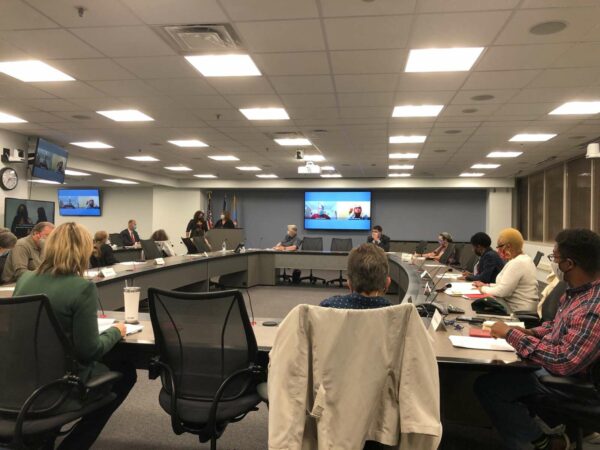
Though they have cropped up with increasing regularity both locally and nationally in recent years, conversations about how to handle symbolic reminders of the Confederacy remain as emotionally charged as ever.
That was evident in the most recent meeting of Fairfax County’s Confederate Names Task Force, which has been charged with determining whether the county should rename Lee and Lee-Jackson Memorial highways.
“We have a nice taste of different people from different parts of Fairfax that want to weigh in,” task force chair Evelyn Spain said. “We value all of their opinions on whether this end result comes to change the name or not change the name of Fairfax streets.”
The two-hour meeting at the Fairfax County Government Center on Monday (Oct. 18) followed the launch of a community survey last week. Postcards advertising the survey are expected to roll out to residents across the county starting this weekend.
Also accepting public comments by email, phone, mail, and at four upcoming listening sessions, the task force will use the input to inform its recommendation to the Fairfax County Board of Supervisors.
“I don’t want people to be back here in 30 years because we made a wrong decision,” one member said.
The Financial Cost of Changing the Names
Changing the names of both highways could cost Fairfax County anywhere from $1 million to $4 million, Fairfax County Department of Transportation Director Tom Biesiadny told the task force.
According to FCDOT, there are 171 Lee Highway signs along the county’s 14.1-mile stretch of Route 29 and 55 Lee-Jackson Memorial Highway signs on 8.4 miles of Route 50.
The cost varies depending on each kind of sign, particularly ones on traffic light mast arms or other overhead structures. If a new street name is longer than the existing one, replacing the signs will require more work due to the added weight, Biesiadny explained.
“What we’re going to replace it with does matter,” he said.
Biesiadny also reported that, based on estimates from neighboring localities that have adopted new highway names, a name change would cost businesses about $500 each to update their address on signs, stationary, and legal documents, among other possible expenses.
Other jurisdictions are looking at providing grants to cover businesses’ costs, according to Biesiadny, who noted that the county would need to conduct a survey of businesses to get a more precise estimate.
What’s in a (Street) Name?
For the task force, however, the question of whether to rename the highways hinges less on money than on what the names say about a community’s values and identity.
In a facilitator-led discussion on street name criteria, several members cited inclusivity and reflecting Fairfax County’s increasingly diverse population as key concerns. Read More


